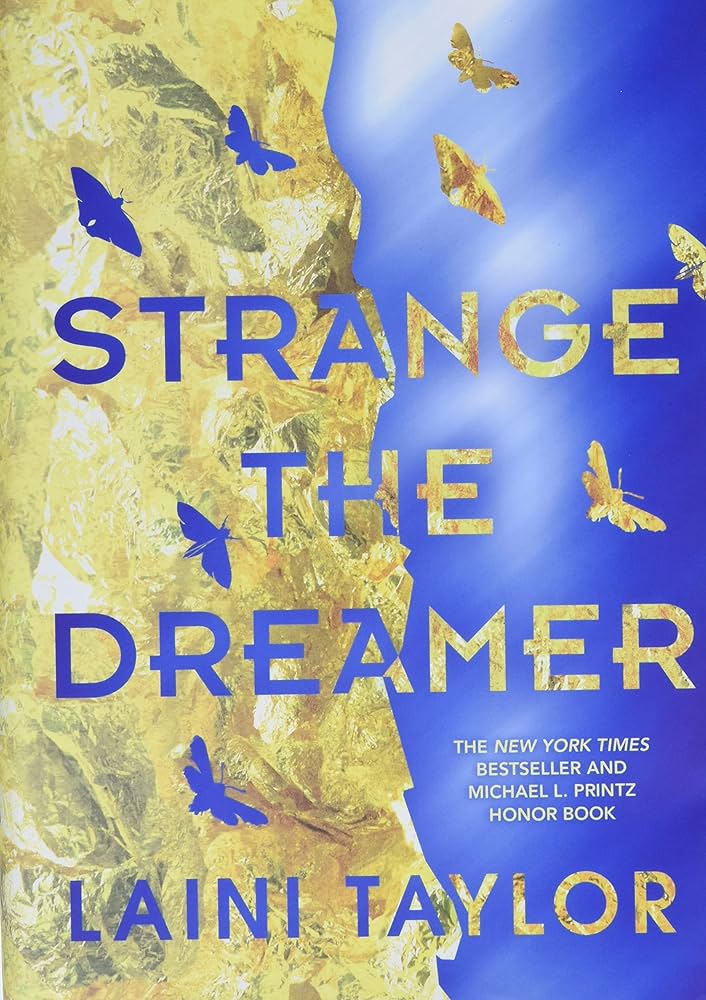“And that’s how you go on. You lay laughter over the dark parts. The more dark parts, the more you have to laugh. With defiance, with abandon, with hysteria, any way you can.”

Year published: 2017
Category: YA fantasy
Representation: F/F and M/M, side characters
Summary: The dream chooses the dreamer, not the other way around—and Lazlo Strange, war orphan and junior librarian, has always feared that his dream chose poorly. Since he was five years old he’s been obsessed with the mythic lost city of Weep, but it would take someone bolder than he to cross half the world in search of it. Then a stunning opportunity presents itself, in the person of a hero called the Godslayer and a band of legendary warriors, and he has to seize his chance or lose his dream forever.
What happened in Weep two hundred years ago to cut it off from the rest of the world? What exactly did the Godslayer slay that went by the name of god? And what is the mysterious problem he now seeks help in solving?
The answers await in Weep, but so do more mysteries—including the blue-skinned goddess who appears in Lazlo’s dreams. How did he dream her before he knew she existed? And if all the gods are dead, why does she seem so real?
My thoughts: I was convinced at the start of the book that I was going to love this one, because the beginning of the book was fairly magical. I think I was initially seduced by the lovely writing style, but style alone is not enough to make me enjoy a book when the characters and plot are lacking.
My enjoyment actively decreased as the book progressed, and by the end I know that I was supposed to be shocked by what happened, but all I could summon up was intense irritation. A few of my problems, in short:
-If there’s one thing that routinely ruins YA fantasy for me, it’s this insistence that authors have on every character being the cleverest and the most quick-witted and the most banter-y. In most cases (including this one) the banter is not as clever as it is supposed to be, generally takes away from the overall tone of the book and makes every character sound the same.
-If there’s a second thing that routinely ruins YA fantasy for me, it’s this insistence that authors have on plopping down a classic case of instalove and expecting readers to care about this relationship as the emotional linchpin of the story. I just don’t know why Lazlo and Sarai are obsessed with each other after eating dream cake together once!
-I might have decided to read the second book, but the last 20 pages of Strange the Dreamer sealed my determination to abandon this series here, because it more or less seems to be a set-up for intolerable romantic angst between Sarai and Lazlo. I’m 99% certain that Muse of Nightmares will be heavily about Minya tormenting Lazlo by controlling Sarai.
There are parts of this book that I did like, especially when Taylor reflects on what both the children and the people of Weep have suffered. It’s a really beautifully written conundrum – neither side is to blame and both are so deeply wounded by the horrors of the past. My favorite bits of the book were the sections that addressed the hatred and fear that arise out of trauma:
“The function of hate, as Sarai saw it, was to stamp out compassion—to close a door in one’s own self and forget it was ever there. If you had hate, then you could see suffering—and cause it—and feel nothing except perhaps a sordid vindication.”
The Godkiller and his wife were interesting characters, with a relationship fractured by trauma and the irreversible acts of violence that freed Weep. I also liked Minya, the oldest of the gods’ children, who is perpetually stuck in a mode of hatred and hypervigilance and self-blame and survivor’s guilt:
“Her lips were still moving, whispering the same words over and over. “They were all I could carry. They were all I could carry.”
But all of this is overshadowed by a tepid, lackluster instalove romance between characters who I never especially came to care about.

Leave a comment